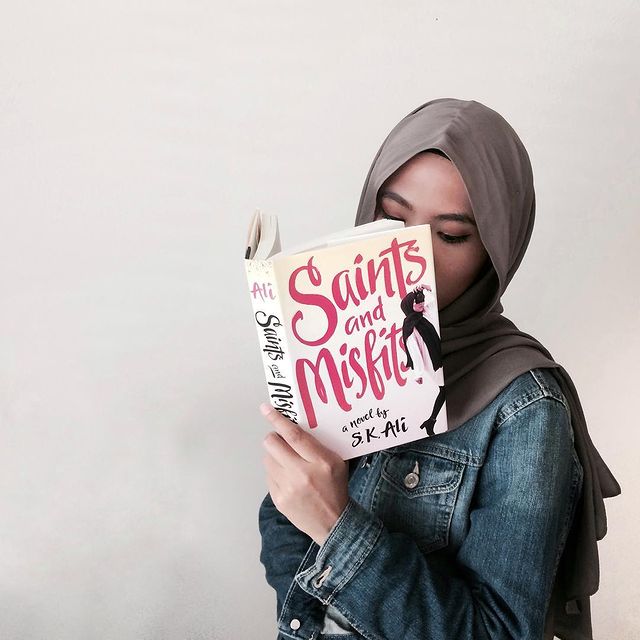Evolving from the bad old patriarchy, gender-based violence, basically referred to as violence against an individual on the basis of their gender, has a long time coming. For the major part, it speaks of the discrimination faced by women on grounds of physical, sexual, psychological or economic suffering.
In the larger circle of torment, gender-based violence has its impacts on the entire human race, irrespective of sex, class or gender. And this is why a worldwide campaign to oppose violence against persons on the basis of their gender was launched. The 16 Days of Activism Campaign is held from 25 November to 10 December every year. However, the success of this campaign rests on our daily individual and collective actions to safeguard our society against this cycle of abuse
We believe that books are one of the most relevant sources of media, educating us about what is happening around us. They present to us, vivid images of reality depicting the closest scenario of incidents. The TMWT team did a blog tour to handpick 16 books in commemoration of 16 days of activism. Enjoy!
1. Nawal El Saadawi’s ‘Woman at Point Zero’

Woman at Point Zero is a novel published in 1975. It is based on Nawal El Saadawi’s real-life encounter with a prisoner named Firdaus on the eve of her execution. Nawal El Saadawi’s interview with Firdaus reveals that Firdaus has experienced a life of poverty, sexual abuse, and patriarchal repression. Firdaus was subject to female genital mutilation and later became a prostitute, gaining economic freedom and amassing wealth. After years of violent abuse from men, Firdaus stabbed a pimp to death. As Firdaus is led to her execution, Saadawi contemplates how courageous Firdaus is.
2. Khaled Hosseini’s ‘A Thousand Splendid Suns‘

Moving on, to the arid topography of Afghanistan, gender-based violence thrives strong in the pages of Khaled Hosseini’s A Thousand Splendid Suns. The book begins with the story of Mariam, an illegitimate daughter of a wealthy businessman, who resents least space in her father’s life and is forced to marry a widower. Suffering miscarriage after miscarriage, Mariam is abused by her husband, both verbally and physically. It becomes clear that Mariam’s only use is in her ability to produce an heir.
The story then intertwines with a younger woman Laila who gets pregnant by her lover. Tricked by Mariam’s husband as her lover being dead, Laila decides to marry him to secure her unborn child’s identity. There the role of virginity and first sex has been poignantly described by Hosseini. Giving birth to a daughter, Laila faces the worst of her husband. Eventually, the two women in the house find themselves as allies against their abusive husband. The two women live through a rough period for women’s rights in Afghanistan. They are controlled by the government, being treated as property by their husband, and forbidden from taking part in society. Yet through their strength and resilience, the women are able to overcome the obstacles to a much considerable extent.
3. Sally Armstrong’s ‘Uprising: A New Age is Dawning for Every Mother’s Daughter’
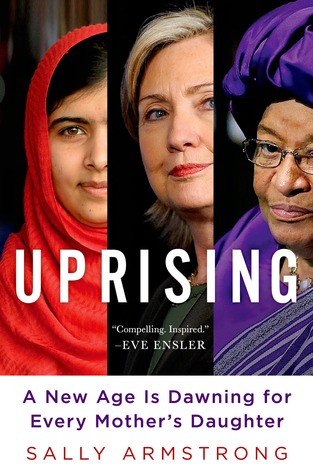
The earth is shifting under the status of women. UPRISING tells a remarkable story about women claiming their own space – against all odds – and how this shift from oppression to emancipation will improve the economy, reduce poverty and curtail conflict. Sally Armstrong, also known as the war correspondent for the world’s women, has been following the action on the front line for women and girls in Bosnia, Egypt, Congo, The Middle East, Afghanistan and America for twenty-five years. She says the manifesto for this revolution is being written in mud-brick huts in Afghanistan and on Tehrir Square in Egypt and in the forests of the Congo, as well as on the streets of Kenya, where 160 girls sued their government for failing to protect them from being raped, and won, and in Pakistan, where Malala Yousafzai, is fighting for the rights of all girls. Armstrong has been an eye witness to the worst atrocities and is now the first to write about the astonishing changes that are happening in Asia, Africa and the Americas.
Her eye-witness reporting has earned her many awards including the Gold Award from the National Magazine Awards Foundation and the Author’s Award from the Foundation for the Advancement of Canadian Letters. She received the Amnesty International Canada Media Award in 2000, 2002 and again in 2011. She was a member of the International Women’s Commission a UN body that consists of 20 Palestinian women, 20 Israeli women and 12 internationals whose mandate is assisting with the path to peace in the Middle East.
4. Meryem Alaoui’s ‘Straight from the Horse’s Mouth

Thirty-four-year-old prostitute Jmiaa reflects on the bustling world around her with brutal honesty, but also a quick wit that cuts through the drudgery. Like many of the women in her working-class Casablanca neighbourhood, Jmiaa struggles to earn enough money to support herself and her family—often including the deadbeat husband who walked out on her and their young daughter. While she doesn’t despair about her profession like her roommate, Halima, who reads the Quran between clients, she still has to maintain a delicate balance between her reality and the “respectable” one she paints for her own more conservative mother.
This daily grind is interrupted by the arrival of an aspiring young director, Chadlia, whom Jmiaa takes to calling “Horse Mouth.” Chadlia enlists Jmiaa’s help on a film project, initially just to make sure the plot and dialogue are authentic. But when she’s unable to find an actress who’s right for the starring role, she turns again to Jmiaa, giving the latter an incredible opportunity for a better life.
In her breakout debut novel, Meryem Alaoui creates a vibrant picture of the day-to-day challenges faced by working people in Casablanca, which they meet head-on with resourcefulness and resilience.
5. Nadia Murad’s ‘The Last Girl: My Story of Captivity, and My Fight Against the Islamic State’

In this intimate memoir of survival, a former captive of the Islamic State tells her harrowing and ultimately inspiring story.
Nadia Murad was born and raised in Kocho, a small village of farmers and shepherds in northern Iraq. A member of the Yazidi community, she and her brothers and sisters lived a quiet life. Nadia had dreams of becoming a history teacher or opening her own beauty salon.
On August 15th, 2014, when Nadia was just twenty-one years old, this life ended. Islamic State militants massacred the people of her village, executing men who refused to convert to Islam and women too old to become sex slaves. Six of Nadia’s brothers were killed, and her mother soon after, their bodies swept into mass graves. Nadia was taken to Mosul and forced, along with thousands of other Yazidi girls, into the ISIS slave trade.
Nadia would be held captive by several militants and repeatedly raped and beaten. Finally, she managed a narrow escape through the streets of Mosul, finding shelter in the home of a Sunni Muslim family whose eldest son risked his life to smuggle her to safety.
Today, Nadia’s story–as a witness to the Islamic State’s brutality, a survivor of rape, a refugee, a Yazidi–has forced the world to pay attention to an ongoing genocide. It is a call to action, a testament to the human will to survive, and a love letter to a lost country, a fragile community, and a family torn apart by war.
6. Susan Faludi’s ‘Backlash: The Undeclared War Against American Women’

When it was first published, Backlash made headlines for puncturing such favourite media myths as the “infertility epidemic” and the “man shortage,” myths that defied statistical realities. These willfully fictitious media campaigns added up to an anti-feminist backlash. Whatever progress feminism has recently made, Faludi’s words today seem prophetic. The media still love stories about stay-at-home moms and the “dangers” of women’s career ambitions; the glass ceiling is still low; women are still punished for wanting to succeed; basic reproductive rights are still hanging by a thread. The backlash clearly exists.
With passion and precision, Faludi shows in her new preface how the creators of commercial culture distort feminist concepts to sell products while selling women downstream, how the feminist ethic of economic independence is twisted into the consumer ethic of buying power, and how the feminist quest for self-determination is warped into a self-centred quest for self-improvement. Backlash is a classic of feminism, an alarm bell for women of every generation, reminding us of the dangers that we still face.
7. Susan Brownmiller’s ‘Against Our Will: Men, Women and Rape’
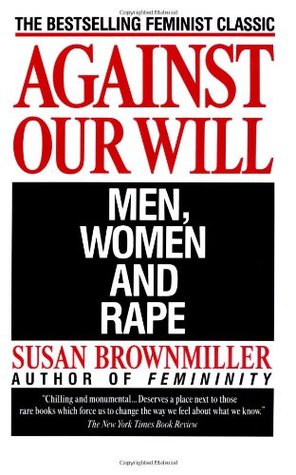
As powerful and timely now as when it was first published, AGAINST OUR WILL stands as a unique document of the history of politics, the sociology of rape and the inherent and ingrained inequality of men and women under the law. In lucid, persuasive prose, Brownmiller has created a definitive, devastating work of lasting social importance.
Chosen by THE NEW YORK TIMES BOOK REVIEW as One of the Outstanding Books of the Year.
8. Virginia Woolf’s ‘A Room of One’s Own’

A Room of One’s Own is an extended essay by Virginia Woolf. First published on the 24th of October, 1929, the essay was based on a series of lectures she delivered at Newnham College and Girton College, two women’s colleges at Cambridge University in October 1928. While this extended essay in fact employs a fictional narrator and narrative to explore women both as writers and characters in fiction, the manuscript for the delivery of the series of lectures, titled Women and Fiction, and hence the essay, are considered nonfiction. The essay is seen as a feminist text, and is noted in its argument for both a literal and figural space for women writers within a literary tradition dominated by patriarchy.
9. Louise Brown’s ‘The Dancing Girls of Lahore: Selling Love and Saving Dreams in Pakistan’s Pleasure District’

Sociologist Louise Brown spent four years in the most intimate study of the family life of a Lahori dancing girl. With beautiful understatement, she turns a novelist’s eye on a true story that beggars the imagination. Maha, a classically trained dancer of exquisite grace, had her virginity sold to a powerful Arab sheikh at the age of twelve; when her own daughter Nena comes of age and Maha cannot bring in the money she once did, she faces a terrible decision as the agents of the sheikh come calling once more.
10. Anthology: ‘A Memory, a Monologue, a Rant, and a Prayer: Writings to Stop Violence Against Women and Girls’, Edited by Eve Ensler and Mollie Boyle

This groundbreaking collection, edited by author and playwright Eve Ensler, features pieces from “Until the Violence Stops,” the international tour that brings the issue of violence against women and girls to the forefront of our consciousness. These diverse voices rise up in a collective roar to break open, expose, and examine the insidiousness of brutality, neglect, a punch, or a put-down. Here is Edward Albee on S&M; Maya Angelou on women’s work; Michael Cunningham on self-mutilation; Dave Eggers on a Sudanese
abduction; Carol Gilligan on a daughter witnessing her mother being hit; Susan Miller on raising a son as a single mother; and Sharon Olds on a bra.
These writings are inspired, funny, angry, heartfelt, tragic, and beautiful. But above all, together they create a true and profound portrait of this issue’s effect on every one of us. With information on how to organize an “Until the Violence Stops” event in your community, A Memory, a Monologue, a Rant, and a Prayer is a call to the world to demand an end to violence against women.
11. Akwaeke Emezi’s Freshwater

An extraordinary debut novel, Freshwater explores the surreal experience of having a fractured self. It centers around a young Nigerian woman, Ada, who develops separate selves within her as a result of being born “with one foot on the other side.” Unsettling, heartwrenching, dark, and powerful, Freshwater is a sharp evocation of a rare way of experiencing the world, one that illuminates how we all construct our identities.
Narrated by the various selves within Ada and based in the author’s realities, Freshwater dazzles with ferocious energy and serpentine grace, heralding the arrival of a fierce new literary voice.
11. Channel Miller’s ‘Know My Name’
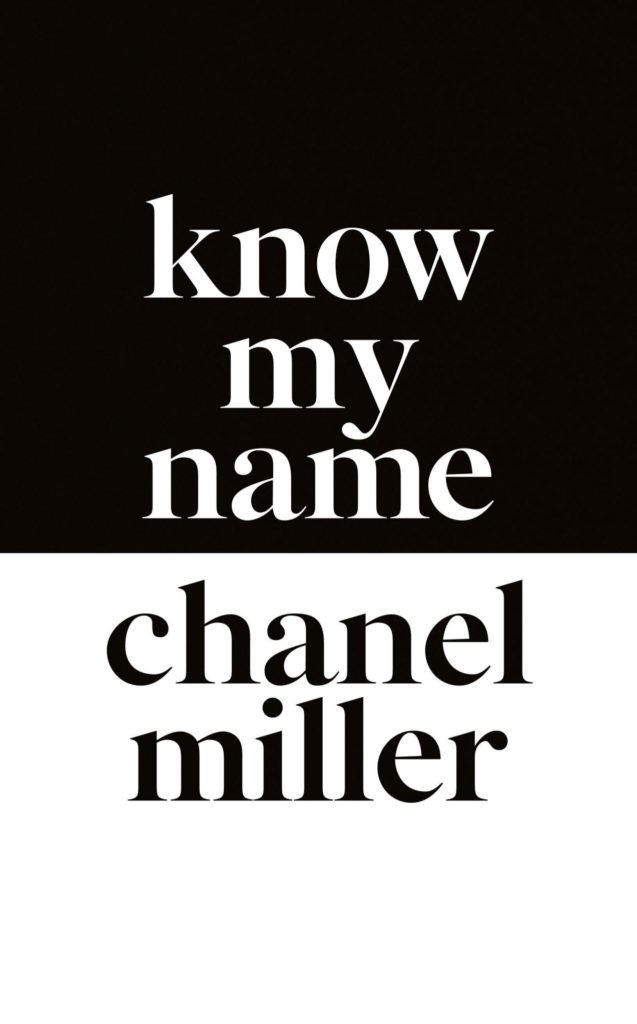
Channel Miller’s ‘Know My Name’ illuminates a culture biased to protect perpetrators, indicts a criminal justice system designed to fail the most vulnerable, and, ultimately, shines with the courage required to move through suffering and live a full and beautiful life.
Know My Name will forever transform the way we think about sexual assault, challenging our beliefs about what is acceptable and speaking truth to the tumultuous reality of healing. It also introduces readers to an extraordinary writer, one whose words have already changed our world. Entwining pain, resilience, and humor, this memoir will stand as a modern classic.
12. All the Silent Spaces: A Memoir by Christine Ristaino
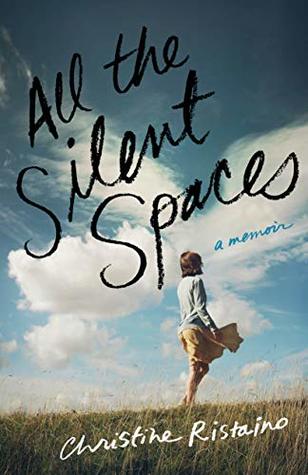
In September 2007, Christine Ristaino was attacked in a store parking lot while her three- and five-year-old children watched. In All the Silent Spaces, Ristaino shares what it felt like to be an ordinary person confronted with an extraordinary event—a woman trying to deal with acute trauma even as she went on with her everyday life, working at a university and parenting two children with her husband. She not only narrates how this event changed her but also tells how looking at the event through both the reactions of her community and her own sensibility allowed her to finally face two other violent episodes she had previously experienced. As new memories surfaced after the attack, it took everything in Ristaino’s power to not let catastrophe unravel the precarious threads holding everything together.
Moving between the greater issues associated with violence and the personal voyage of overcoming grief, All the Silent Spaces is about letting go of what you think you know in order to rebuild.
13. Nechama Brodie’s Femicide in South Africa
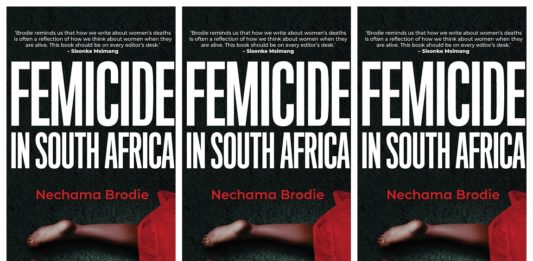
Published in 2020, this book by author and journalist Nechama Brodie looks at the story of femicide and gender-based violence in South Africa over the past 40 years. Brodie examines all the different manifestations of GBV from intimate partner violence to brutal rapes and the killing of black lesbian women. The book attempts to understand the intellectual work done around the issue, the actual statistics of femicide as well as the misinformation that has cropped up. But more than that Brodie tries to ensure the reader understands who are the real victims and survivors and more importantly the perpetrators that need to remain at the centre of the conversations.
14. Laura Bates’ ‘Everyday Sexism’

Everyday Sexism is another important read to include in the discourse around gender-based violence. The book was inspired by a project of the same name. After author Laura Bates was sexually harassed in 2012 on London public transport she started the project. The project was a collection of stories and responses from around the world with women sharing their experiences of sexism. The book gives a voice to the protest against sexism. It contains many different stories from women in the workplace, women in education, women in public spaces and male experiences. The nuances of the stories makes this a must read.
15. Tanaz Bhathena’s ‘A Girl Like That’

Sixteen-year-old Zarin Wadia is many things: a bright and vivacious student, an orphan, a risk-taker. She’s also the kind of girl that parents warn their kids to stay away from a troublemaker whose many romances are the subject of endless gossip at school. You don’t want to get involved with a girl like that, they say. So how is it that eighteen-year-old Porus Dumasia has only ever had eyes for her? And how did Zarin and Porus end up dead in a car together, crashed on the side of a highway in Jeddah, Saudi Arabia? When the religious police arrive on the scene, everything everyone thought they knew about Zarin is questioned. And as her story is pieced together, told through multiple perspectives, it becomes clear that she was far more than just a girl like that.
16. Meena Kandasamy’s ‘When I Hit You’

Seduced by politics and poetry, the unnamed narrator falls in love with a university professor and agrees to be his wife, but what for her is a contract of love is for him a contract of ownership. As he sets about reducing her to his idealised version of a kept woman, bullying her out of her life as an academic and writer in the process, she attempts to push back – a resistance he resolves to break with violence and rape.
Smart, fierce and courageous When I Hit You is a dissection of what love meant, means and will come to mean when trust is undermined by violence; a brilliant, throat-tightening feminist discourse on battered faces and bruised male egos; and a scathing portrait of traditional wedlock in modern India.




